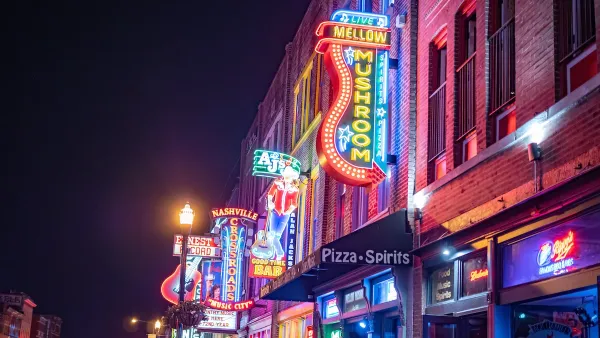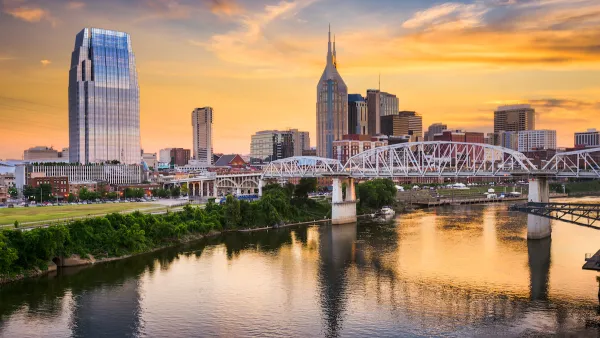Nashville has flourished economically and culturally with new residents, immigrants, tourists and country music. Kim Severson discusses how this traditionally Southern city has gained the nation's fancy.
Last year, Nashville was ranked in the top five regions for job growth by a Gallup poll, recognized as one of the best places to begin a technology start-up by a national entrepreneurs' group, and dubbed "Nowville" by GQ. The music industry has helped boost the region's economy with country musicians and producers flocking to "a state with no income tax and a ready-made talent pool." The annual Grammy nomination concert in December was held in Nashville instead of Los Angeles for the first time, and city officials are centering tourism around Music City Center, a huge convention center to be attached to the Country Music Hall of Fame and a new $270 million Omni hotel.
"Here in a fast-growing metropolitan region with more than 1.6 million people, the ingredients for Nashville's rise are as much economic as they are cultural," says Severson, "and, critics worry, could be as fleeting as its fame." Nashville's growth has been relatively stable and modest compared to other Southern cities like Atlanta, which meant "a softer fall and a quicker path out of recession." Garrett Harper, vice president for research with the Nashville Chamber of Commerce, said, "Unemployment in Davidson County, which includes Nashville, is about 5.7 percent, compared with 7.8 percent nationally, and job growth is predicted to rise by 18 percent in the next five years." The city's economic growth can be attributed to not only the music industry, but also health care management, religious publishing, car manufacturing and higher education.
However, to pay for large development projects, the city has offered generous tax breaks and incentives which critics consider an "outdated economic strategy." Emily Evans, a member of the region's Metropolitan Council, explains, "In giving away your tax base for the purpose of expanding your tax base in the future, you make it difficult to deliver on the fundamentals, the things that make your city livable, like parks and roads and schools." Other skeptics agree that "to be a truly great city, it has to be a place that tends to its residents first and tourists second." Many of Nashville's residents, including Mayor Karl Dean, believe that more attention needs to be given to education, transportation and social issues, but for now, they are enjoying living in the nation's "it" city.
FULL STORY: Nashville’s Latest Big Hit Could Be the City Itself

Analysis: Cybertruck Fatality Rate Far Exceeds That of Ford Pinto
The Tesla Cybertruck was recalled seven times last year.

National Parks Layoffs Will Cause Communities to Lose Billions
Thousands of essential park workers were laid off this week, just before the busy spring break season.

Retro-silient?: America’s First “Eco-burb,” The Woodlands Turns 50
A master-planned community north of Houston offers lessons on green infrastructure and resilient design, but falls short of its founder’s lofty affordability and walkability goals.

Test News Post 1
This is a summary

Analysis: Cybertruck Fatality Rate Far Exceeds That of Ford Pinto
The Tesla Cybertruck was recalled seven times last year.

Test News Headline 46
Test for the image on the front page.
Urban Design for Planners 1: Software Tools
This six-course series explores essential urban design concepts using open source software and equips planners with the tools they need to participate fully in the urban design process.
Planning for Universal Design
Learn the tools for implementing Universal Design in planning regulations.
EMC Planning Group, Inc.
Planetizen
Planetizen
Mpact (formerly Rail~Volution)
Great Falls Development Authority, Inc.
HUDs Office of Policy Development and Research
NYU Wagner Graduate School of Public Service




























